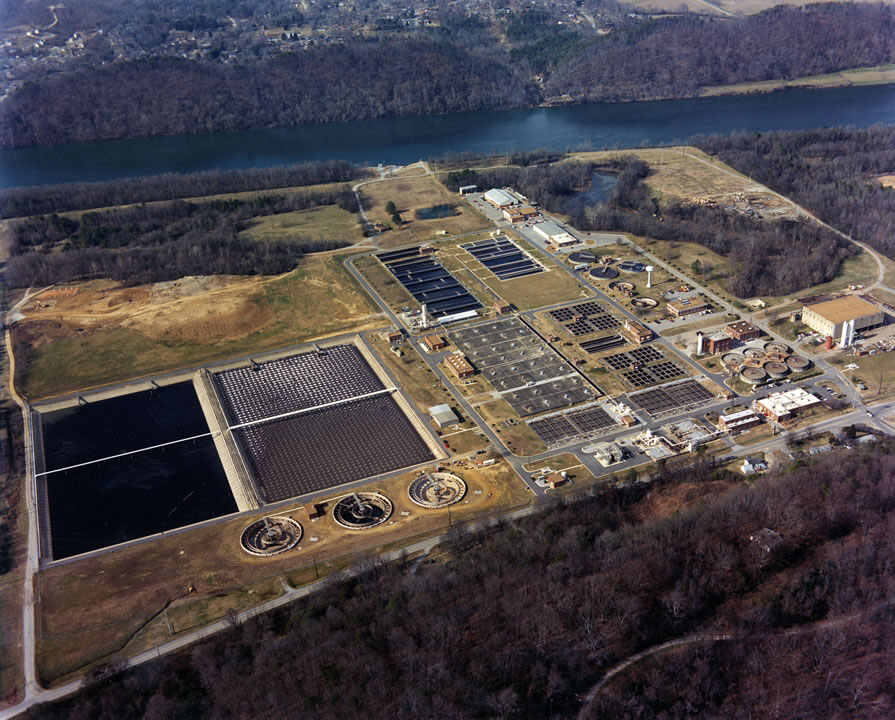THERE’S CASH IN THAT TRASH
Rayburn Casey Hall
In addition to my other duties at the Moccasin Bend Waste Water Treatment Plant, I served as a tour guide. Tours were given to elementary, middle, and high school science classes. University of Tennessee at Chattanooga and Chattanooga State Community College brought their environmental classes for tours each semester. And several clubs, Kiwanis and engineers requested tours a couple of times a year.
There were four questions that somebody in the group would always ask me. 1. How long you been here? 2. Do you ever get used to the smell? 3. Has anybody ever fell in? 4. What is the strangest thing that you have ever seen in the sewers?
I would always tell about the strange phone call the front office receptionist got from a local hospital one day. An employee at the hospital dropped a section of a cancerous colon down the drain to a sewer. They called and requested that we be on the lookout for it coming into the plant. It was never seen, but it was the conversation around the plant for a day or two, and a good story to tell the tour groups.
Strangely the people in the groups weren’t surprised when I told them about all the gold and diamond jewelry that had been found in the sewers by the people working in manholes and sewer lines. Just about everybody had dropped something of value down the sink, or flushed a piece of jewelry down the commode or they knew somebody that had had the experience.
But they couldn’t believe their ears when I told them about all the paper money that had been found in the trash and the grit after it was removed from the waste water. The rings, brackets, necklaces, knives, cigarette lighters, and coins were small enough in size and heavy enough to sink and settle out in the sewer lines before reaching the plant. But the paper money, plastic credit cards and driver’s license, wallets and purses would go with the flow into the plant. Before the sewage entered the plant there was a bar screen that screened out the trash before it entered the treatment area. Some of the paper money, wallets and purses would get trapped on the screen. An automatic rake and conveyor carried the trash to a dumpster. Employees would rake the pile down every few hours and sometimes find as much as a 20 dollar bill. It didn’t happen every day but it happened often enough that we didn’t have any problems with the buckets running over.
Money or Ids were rarely found in the wallets and purses because most of them had been stolen, cleaned out, and thrown down the storm drains. If a credit card was found the bank issuing it was notified and if a driver’s license was found we contacted the owner
Some of the paper money and plastic cards would pass through the screens and would get mixed in the grit and would be removed to a dumpster with a continuous operating rake. Employees raking the grit buckets down to keep them from piling up and running over found a lot of ones, fives, tens, and twenties. I found a lot of ones, a twenty a few times. But to my knowledge there was only one, hundred dollar bill ever found.
Years and years ago before there was an automatic screening system, employees had to clean the bar screens manually with a rake, put it in a bucket, and haul it to a dumpster. There was one operator that worked there about ten years before retiring, and he insisted on cleaning the bar screens himself when he was on duty. It was estimated that while he was there, for that ten year span, that he found enough money to match his salary for about a month.
Most of the paper money could be washed and cleaned and spent without anybody knowing that it had been found in the sewage. But if a bill was found and had gone through some rough treatment and torn up, it was carried to the bank to be exchanged for a good one, if it still had the serial number. You could see the teller wasn’t sure about touching the bill, and would ask the finder where they got it. When she was told that it was found in the sewage, a nauseated look would come over face, and she would find something on her work station to rake it in a drawer.
Just goes to show you, there can be a silver lining wherever you look, even in a sewer.
Please let me know that you were here by making a comment. If you like the subject of my blog I hope you will become a follower.
PROFESSIONAL WASTE WATER OPERATIONS CREED
We, the members of the Professional Wastewater Operations Division, are dedicated to the task of conserving a healthy environment for terrestrial and aquatic life.
We, are obligated by duty, conscience and personal power to meet at a minimum permit limits as set forth by this state, province, or country.
We, as operations professionals, will fulfill our responsibility to protect the interest and investment in the facility by maintaining safe,attractive,economical, and efficient wastewater treatment facilities to the best of our ability.
We, will endeavor to increase our knowledge and skills in modern technology in the science of water pollution control to advance to the point of returning water back to its natural state upon which all forms of life depend.
Created 1986 By
Rayburn Casey Hall
Moccasin Bend Waste Water Treatment Plant
Chattanooga, TN.
KY-TN PWOD Representative
Adopted by the WEF 1992

No comments:
Post a Comment